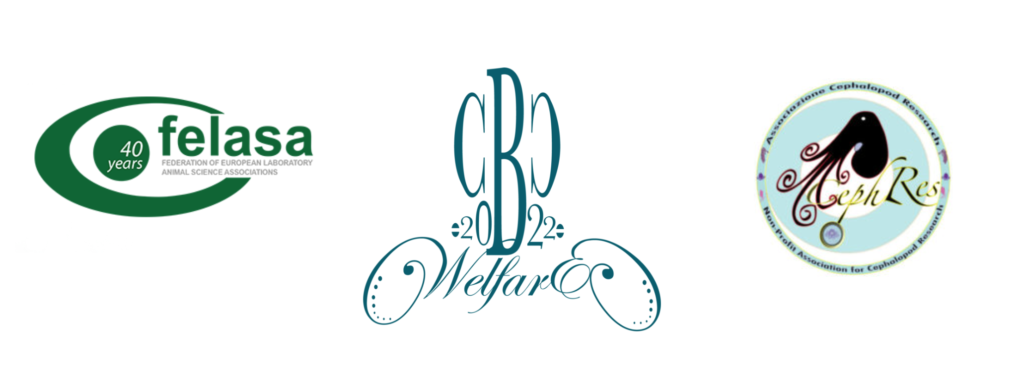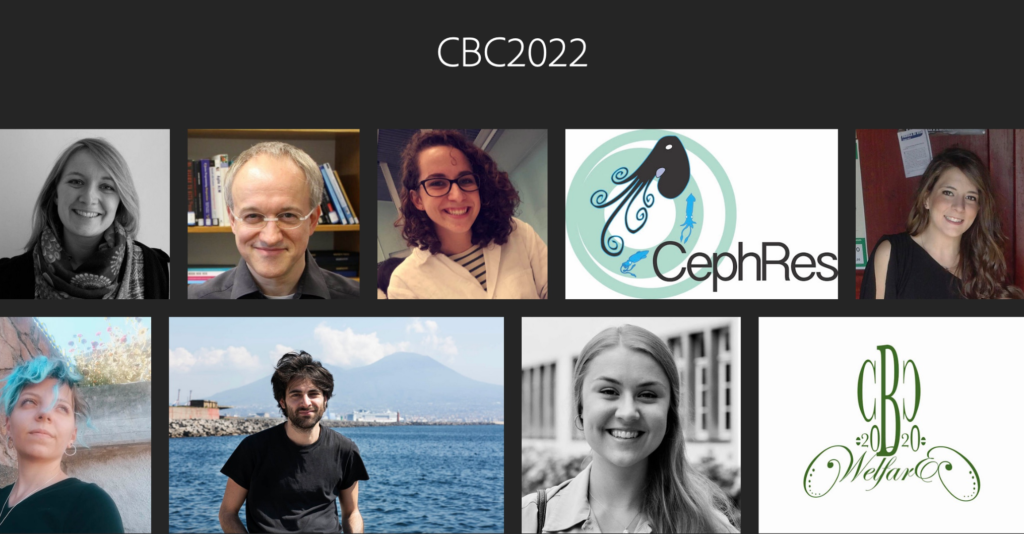
FELASA accredited course on cephalopods as laboratory animals (FELASA 062/18F) in compliance with Directive 2010/63 functions: A, C, D
Cephalopod Biology and Care
for increase of animal welfare
CBC 2022: February 14 - March 11, 2022 (online)
Second Session: December 13 – 16, 2022

The CCBC 2022 Class
(1st Cohort)

The CCBC 2022 Class
(2nd Cohort)
CBC Training Program is designed to provide lectures, case study/problem-based learning (PBL), student’s presentations, seminars/tutorials, practical hands-on training, etc.
The official language of the CBC Training Program is English
The original scheme included training during face-to-face sessions. We started to experience online live training scheme due to COVID-19 pandemics. We now implemented a mixed training scheme with preliminary online sessions, followed by a full immersion (4/5 days, depending on the species-modules requested) In-Person training classroom-based learning experience.
CBC Training Program is designed around the “Working document on the development of a common education and training framework to fulfil the requirements under the Directive 2010/63/EU”, and includes:
Core Modules
Function Specific Modules:
• Function A: “carrying out procedures on animals”
• Function C: “person taking care of animals”
• Function D: “person killing animals”
CBC is designed around Cephalopod Biology and Care and based on cephalopod species-specific training based on Learning Outcomes as identified in the above-mentioned EU working document.
CBC is now expanding to meet and include species that share with cephalopods the Biota, i.e. marine fish – as the sole other species included in the Directive 2010/63/EU that live at sea. We recognize that a well-established research has been centered on these organisms, and that nowadays there is an increasing interest towards a welfare-oriented approach to study these animals. We will put our E&T experience to serve the scientific community to continue to grow.
CBC Training Program encompass information useful to scientists, students, post-docs, qualified veterinarians, technicians, and people required to handle cephalopods and other organisms, including capture from the wild, especially in light of the Directive and its transposition in Member States. We are planning to extend our accreditation to Function B within the next months/years.
The recommendations and training we provide is based on EU-Directive 2010/63 standards, but is applicable everywhere in any non-EU countries. The course covers also a. non-invasive or minimally invasive approaches as applied to cephalopods and marine fish, and b. management and assessment of animal welfare including establishment and monitoring cephalopods and/or marine fishes for their physiological and behavioural needs.
Assessment – Trainees of the CBC Training Program courses have to pass an individual assessment; this will allow to receive a CBC FELASA certificate and ad-hoc additional certifications. The certification for marine fish species-specific is pending FELASA accreditation.
Individual assessment is based on learning outcomes in compliance with the above-mentioned requirements. Trainees have to face a three-steps examination combining Single Best Answer (SBA) and Short Answer Questions (or SAQs) online and then in person (this is the revised scheme starting from CBC2022 edition). Practical Training (Demo and Hands-on) is followed by OSPE assessment (objective structured practical examination) for practical skills (based on LOs). Trainees that not pass the final examination session will be allowed to attend an Exam Retake session organized no later than two months from the end of the course.
How CBC2022 runs:
1. Teaching is delivered on-line, assuring virtual simultaneous presence of the Member of the Faculty, and at least a Tutor of the CBC Core Team and the Trainees
2. Each lecture/session in our program is delivered into 1-3 consecutive days, depending on the original duration, and specific Q&A and summary sessions are added during the entire training program
3. Virtual teaching experience is adopted including White/Black-Board platforms to facilitate interaction, guidance and Q&A. IT-Tools are adopted to warrant adequate levels of individual attention, participation and interaction
4. Training material (i.e. presentations delivered and readings) is available through the CBC SharePoint to Registered Trainees
5. The on-line phase will be followed by an intensive face-to-face in-Person training classroom-based learning (Theory and Group Work)
6. Practical session training (hands-on)
7. Final Assessment
Course PLAN:
Phase 1: Theory (on-line) – include seminars and group work
Phase 2: Preliminary Assessment
Phase 3: In-Person training classroom-based learning & Practical Training sessions
Phase 4: Final Assessment and Exams
CBC Trainees are assisted for any possible misunderstanding due to language comprehension
The official registration to the CBC2022 FELASA A/B/C course is now open (again!)
Registration is on first-come, first-served basis.
A maximum of 25 trainees maybe accommodated!
There are two registration fees: one for people that want to provide lodging on their own, and one including course registration, lodging and all lunches.
COURSE REGISTRATION fee: Full: 1000.00 euro – Single Taxon: 800 euro
Full course registration fee is intended for those would like to acquire Training on both taxa (cephalopods & marine fish); ‘single taxon’ is intended for Trainees interested in Training on either cephalopods or marine fish.
The Course Registration Fee includes:
• course material
• access to the CBC SharePoint including teaching material (access up to one year after the end of the course)
• coffee breaks and light lunches during Phase #3 and #4
• Final certificate (for those that pass after examination)
• One year CPD (continuous professional development, advice – after the certification)
Registration fee is due within 10 days after confirmation of registration, as indicated in the confirmation email!
All payments are in EUR. The registration system will take your data in respect to the privacy and the most advanced data-encryption method to secure your data. After processing your registration, you will receive an email and instructions for the payment, in agreement with the method selected during registration. If payment will be not completed as indicated in the registration confirmation email, your registration to the CBC course will not be finalized and Course Organizer Team will contact you as follow-up.
We accept credit cards and payment through bank transfers.
After your payment is verified your registration is finalized.
The confirmation of payment of the registration fee is the sole method to assure confirmation of registration. This will allow accessing Students’ SharePoint and the preliminary training required to fulfil the Training & Education Criteria required by this course.
A receipt as proof of payment of the Registration Fee will be issued according to fiscal rules valid in EU and Italy. In the case of need of a VAT invoice this will be issued accordingly.
Depending on bank and/or credit card processing fees, bank charges related with the payment will be at registrant own expense.
We do not accept payments by check, at dates not agreed and/or at the Venue.
Partial refund of the Registration Fee will be provided in case of cancelling two-weeks before the In-Person session and/or the official start of the Course. CephRes Finance Dept will evaluate case-by-case. A 300 euro secretarial costs will be deduced from the costs of registration, as cancellation fee. There will be no refund for no-show.
A receipt for the cancellation fee will be issued.
No financial support will be provided.
However, based on a specific request the CBC CO Team & CephRes will evaluate waivers based on established criteria. To apply to a waiver contact CBC CO Team[dticon ico=”icon-miu-email73″][/dticon]
At the end of the Course each Trainee has to pass an individual assessment of the learning outcomes (final examination).
The assessment takes place on the last afternoon (or morning) of the course, depending on the schedule. This is a formal assessment so will be conducted under exam conditions.
The assessment will comprise a written paper lasting 90 mins, plus a practical skills‐based assessment. The written assessment consists of two types of questions (Single Best Answer, SBA; Short Answer Questions, SAQ).
For the Practical assessment, Objective Structured Practical Examination (OSPE) assessment will be applied.
Pass criteria
a) The Trainee is expected to attend all formal training sessions.
b) The Trainers may assess participation/engagement, and the Course Program encourages each student to participate and share knowledge and experience with other course participants.
c) Trainee must obtain 70% on the written assessments (SBA [60marks] and SAQ [30marks]; 63/90 to pass this component). This pass mark is based on recommendations in the Directive training document and reflects the essentially core nature of the majority of material covered in this course. Some of the questions are considered critical (see #e, below) and incorrect answers to those questions will not allow to pass, despite reaching the threshold of correct answers.
d) For the practical/skills task, each Trainee is awarded 10 marks is pass-criteria and 0 marks if not.
e) Among questions asked during the written exam (and during the OSPE) there are some critical ones and that despite the final marks, a Trainee maybe considered not to pass if failing in more than two(2) of the ‘critical’ questions.
To pass the course each student must pass both the written (SBA+SAQ) and practical (OSPE) elements.
During examinations, each Trainee is asked to do his/her own work. Talking or discussion is not permitted during the examination, nor compare papers, copy from others, collaborate in any way. Any interaction with other people, or collaborative behaviour during the examination will result in failure of the exam and may lead to failure of the course.
Final Mark is provided in the form of overall mark for SBA+SAQ as a percentage indicating pass/fail (pass mark 70%) for the written paper overall. Weaknesses in any specific module will be noted.
Examination Retake Procedure
Students who fail are asked for ʺretaking the assessmentʺ. If they accept the following procedure is applied. After accepting to retake the assessment, students are allowed one month to study the reading and teaching material provided through the CBC Sharepoint. The ‘exam retake’ consists in an online examination followed by a short interview, with an expected duration of about 90 minutes. The session is recorded (both audio and video, for future records and to provide documents for subsequent evaluation). During the interview the student is asked to do not have access to any other support apart from a stable/reliable Internet connection, and a web‐cam that will allow the Examination Committee (at least two members of the CBC Faculty) to interview the student in person.
Students are assisted for any possible misunderstanding due to language comprehension.
As for the original session, the pass criterion is fixed to 70%.
The interview is carried out in English.
As a consequence of the COVID-19 pandemic, CephRes and the CBC Training Program Core Team decided to continue its commitment in Training and Education of the Scientific Community and adopting a virtual training experience. This is aimed to limit moving people around countries, and any possible difficulties may emerge considering the different nationalities involved. Care for All Trainees and Trainers is our foremost priority
The CBC2022 FELASA accredited Course (CBC2022 ‘Virtual’ Training) aims to meet your needs and expectations in this challenging time and will offer the same cutting edge scientific and specialist training program including lectures, seminars, interactive experience, Questions&Answers as planned originally.
Accessible from all over the world to registered Trainees, CBC Virtual Training represents an exciting alternative to the regular ‘physical’ face-to-face training format. Professionally implemented online, we will adopt the cutting-edge web-based technology to facilitate your training and promote interaction between Trainees and the Faculty (CephRes adopted CISCO Webex Suite and BlackBoard Collaborate – the systems will be further implemented in CephRes website in the future, for improving continuing support and training experience).
Practical hands-on sessions and final assessment (OSPE) is scheduled to occur “in person” (December 12-16, 2022) at:
Institute of Agrifood Research and Technology (IRTA)
Carretera de Poble Nou, km 5,5, 43540
La Ràpita, Tarragona, Spain

Last update, November 22th 2022

